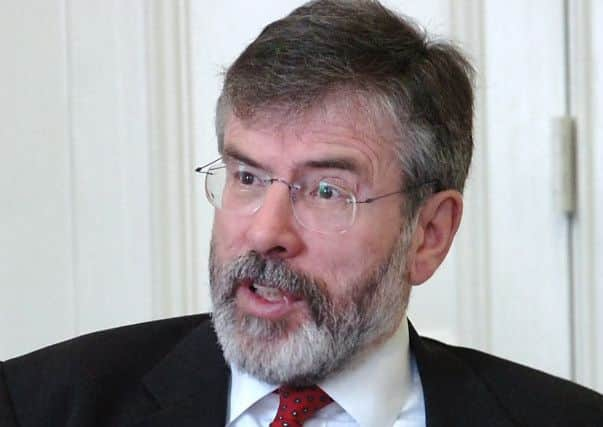Sam McBride: SF's key demand could mean there is no inquiry into RHI scandal


But if Mrs Foster sticks to her entrenched position and Sinn Fein sticks to its demand, we are facing a snap election. In that scenario, there are three immediate implications for dealing with the RHI scandal – and all of them are negative.
While a section of the public clearly believes that Mrs Foster should stand down, there is no reason why her continuing in office would stop the truth about RHI emerging if, as Sinn Fein assures us, the inquiry would be entirely independent of the Executive.
Advertisement
Hide AdAdvertisement
Hide AdEven if she did stand aside for the symbolic four weeks Sinn Fein has requested, Mrs Foster would remain DUP leader and whoever the temporary first minister was would be taking instructions from her.
If Sinn Fein does collapse Stormont, the first consequence would be that no independent investigation whatsoever would be undertaken into the RHI scheme – and even the inquiry by the Assembly’s Public Accounts Committee would be ended.
Sinn Fein’s aversion to setting up a full public inquiry under the Inquiries Act 2005 means that in order for its preferred form of investigation to have any teeth the Assembly will have to pass emergency legislation giving the inquiry power to compel witnesses and documents. It would also have to incorporate criminal sanctions for anyone refusing to co-operate in those areas.
That legislation is within the competency of the Assembly – almost identical provisions are contained within The Inquiry into Historical Institutional Abuse Act (Northern Ireland) 2013 which set up Sir Anthony Hart’s public inquiry into child abuse in care homes.
Advertisement
Hide AdAdvertisement
Hide AdStipulations in the Assembly’s standing orders mean that a bill giving an RHI inquiry those powers would take at least 10 days to make it through the legislature.
Even after that period, Royal Assent is needed before the bill becomes statute and that could take around two weeks.
The Assembly is scheduled to return from recess next Monday. Assuming that the bill has been drafted by then (which it may not be), and assuming the swiftest possible passage through the chamber, it is unlikely to become law until mid-February.
However, if Sinn Fein follows through on its threat to collapse the Executive over Mrs Foster’s position, none of this can take place because there will be no legislative Assembly to pass the legislation.
Advertisement
Hide AdAdvertisement
Hide AdIn that scenario, the second consequence comes into play. Sinn Fein might then belatedly decide that although it was not its preferred option it would attempt to set up a full public inquiry.
However, by that stage that too would be impossible using the mechanisms now open to Stormont ministers.
The Inquiries Act 2005 refers to “a Northern Ireland minister” as having the power to set up a public inquiry under its terms – which include key provisions such as evidence being taken under oath and powers of compulsion.
While there is a separate provision for the secretary of state setting up a public inquiry, there can be no guarantee that he would do so and to date he has attempted to stay as far out of the issue as possible.
Advertisement
Hide AdAdvertisement
Hide AdThe third – and financially significant – consequence for the RHI scandal if the Executive collapsed would be that attempts to slash the losses of the scheme would immediately flounder.
As with the emergency legislation for setting up an inquiry, the legislation which the DUP wants to use to rein in spending on RHI can only pass if there is a legislative Assembly in place.
Given those three fundamentally negative consequences for getting to the truth of the RHI scandal and cutting the losses to taxpayers, it is difficult to understand Sinn Fein’s key demand if it is viewed through the prism of addressing the RHI debacle.
There are those in senior Stormont positions who believe that something much bigger is afoot. Certainly, Sinn Fein is under massive pressure from its grassroots over the perception that the DUP has been running rings around its Stormont operation long before this issue came to light.
Advertisement
Hide AdAdvertisement
Hide AdIt is also the case that Martin McGuinness is seriously ill and Gerry Adams is increasingly taking command in this crisis.
Does that explain why Sinn Fein’s initial response to this issue was beyond restrained, but now it is talking up the crisis and seemingly pressing for a fresh round of crisis talks taking in everything from the Irish language to a Bill of Rights?